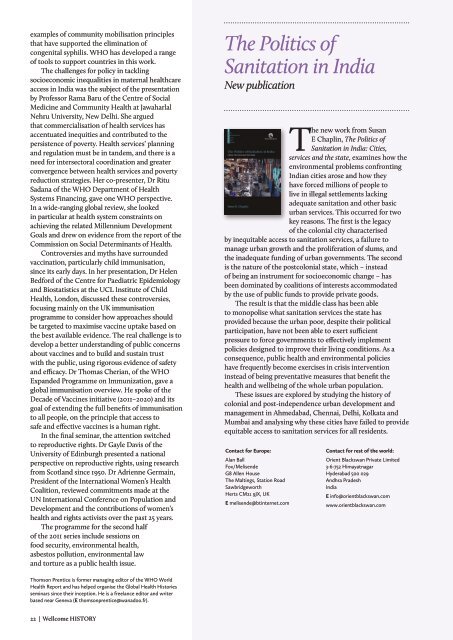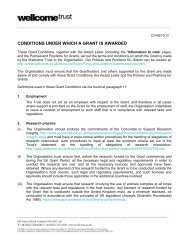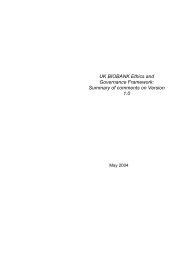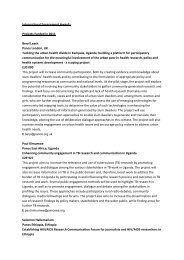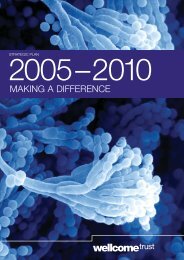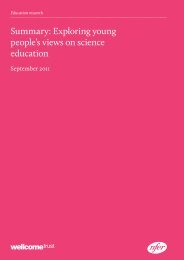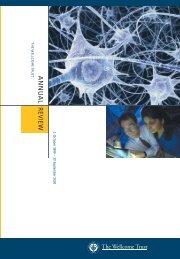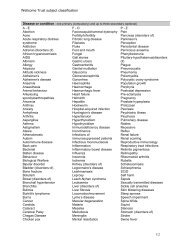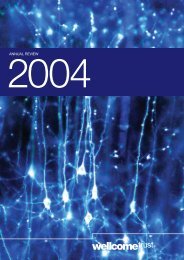(1839–1910) Medical history in Japan - Wellcome Trust
(1839–1910) Medical history in Japan - Wellcome Trust
(1839–1910) Medical history in Japan - Wellcome Trust
Create successful ePaper yourself
Turn your PDF publications into a flip-book with our unique Google optimized e-Paper software.
examples of community mobilisation pr<strong>in</strong>ciplesthat have supported the elim<strong>in</strong>ation ofcongenital syphilis. WHO has developed a rangeof tools to support countries <strong>in</strong> this work.The challenges for policy <strong>in</strong> tackl<strong>in</strong>gsocioeconomic <strong>in</strong>equalities <strong>in</strong> maternal healthcareaccess <strong>in</strong> India was the subject of the presentationby Professor Rama Baru of the Centre of SocialMedic<strong>in</strong>e and Community Health at JawaharlalNehru University, New Delhi. She arguedthat commercialisation of health services hasaccentuated <strong>in</strong>equities and contributed to thepersistence of poverty. Health services’ plann<strong>in</strong>gand regulation must be <strong>in</strong> tandem, and there is aneed for <strong>in</strong>tersectoral coord<strong>in</strong>ation and greaterconvergence between health services and povertyreduction strategies. Her co-presenter, Dr RituSadana of the WHO Department of HealthSystems F<strong>in</strong>anc<strong>in</strong>g, gave one WHO perspective.In a wide-rang<strong>in</strong>g global review, she looked<strong>in</strong> particular at health system constra<strong>in</strong>ts onachiev<strong>in</strong>g the related Millennium DevelopmentGoals and drew on evidence from the report of theCommission on Social Determ<strong>in</strong>ants of Health.Controversies and myths have surroundedvacc<strong>in</strong>ation, particularly child immunisation,s<strong>in</strong>ce its early days. In her presentation, Dr HelenBedford of the Centre for Paediatric Epidemiologyand Biostatistics at the UCL Institute of ChildHealth, London, discussed these controversies,focus<strong>in</strong>g ma<strong>in</strong>ly on the UK immunisationprogramme to consider how approaches shouldbe targeted to maximise vacc<strong>in</strong>e uptake based onthe best available evidence. The real challenge is todevelop a better understand<strong>in</strong>g of public concernsabout vacc<strong>in</strong>es and to build and susta<strong>in</strong> trustwith the public, us<strong>in</strong>g rigorous evidence of safetyand efficacy. Dr Thomas Cherian, of the WHOExpanded Programme on Immunization, gave aglobal immunisation overview. He spoke of theDecade of Vacc<strong>in</strong>es <strong>in</strong>itiative (2011–2020) and itsgoal of extend<strong>in</strong>g the full benefits of immunisationto all people, on the pr<strong>in</strong>ciple that access tosafe and effective vacc<strong>in</strong>es is a human right.In the f<strong>in</strong>al sem<strong>in</strong>ar, the attention switchedto reproductive rights. Dr Gayle Davis of theUniversity of Ed<strong>in</strong>burgh presented a nationalperspective on reproductive rights, us<strong>in</strong>g researchfrom Scotland s<strong>in</strong>ce 1950. Dr Adrienne Germa<strong>in</strong>,President of the International Women’s HealthCoalition, reviewed commitments made at theUN International Conference on Population andDevelopment and the contributions of women’shealth and rights activists over the past 25 years.The programme for the second halfof the 2011 series <strong>in</strong>clude sessions onfood security, environmental health,asbestos pollution, environmental lawand torture as a public health issue.The Politics ofSanitation <strong>in</strong> IndiaNew publicationThe new work from SusanE Chapl<strong>in</strong>, The Politics ofSanitation <strong>in</strong> India: Cities,services and the state, exam<strong>in</strong>es how theenvironmental problems confront<strong>in</strong>gIndian cities arose and how theyhave forced millions of people tolive <strong>in</strong> illegal settlements lack<strong>in</strong>gadequate sanitation and other basicurban services. This occurred for twokey reasons. The first is the legacyof the colonial city characterisedby <strong>in</strong>equitable access to sanitation services, a failure tomanage urban growth and the proliferation of slums, andthe <strong>in</strong>adequate fund<strong>in</strong>g of urban governments. The secondis the nature of the postcolonial state, which – <strong>in</strong>steadof be<strong>in</strong>g an <strong>in</strong>strument for socioeconomic change – hasbeen dom<strong>in</strong>ated by coalitions of <strong>in</strong>terests accommodatedby the use of public funds to provide private goods.The result is that the middle class has been ableto monopolise what sanitation services the state hasprovided because the urban poor, despite their politicalparticipation, have not been able to exert sufficientpressure to force governments to effectively implementpolicies designed to improve their liv<strong>in</strong>g conditions. As aconsequence, public health and environmental policieshave frequently become exercises <strong>in</strong> crisis <strong>in</strong>tervention<strong>in</strong>stead of be<strong>in</strong>g preventative measures that benefit thehealth and wellbe<strong>in</strong>g of the whole urban population.These issues are explored by study<strong>in</strong>g the <strong>history</strong> ofcolonial and post-<strong>in</strong>dependence urban development andmanagement <strong>in</strong> Ahmedabad, Chennai, Delhi, Kolkata andMumbai and analys<strong>in</strong>g why these cities have failed to provideequitable access to sanitation services for all residents.Contact for Europe:Alan BallFox/MelisendeG8 Allen HouseThe Malt<strong>in</strong>gs, Station RoadSawbridgeworthHerts CM21 9JX, UKE melisende@bt<strong>in</strong>ternet.comContact for rest of the world:Orient Blackswan Private Limited3-6-752 HimayatnagarHyderabad 500 029Andhra PradeshIndiaE <strong>in</strong>fo@orientblackswan.comwww.orientblackswan.comThomson Prentice is former manag<strong>in</strong>g editor of the WHO WorldHealth Report and has helped organise the Global Health Historiessem<strong>in</strong>ars s<strong>in</strong>ce their <strong>in</strong>ception. He is a freelance editor and writerbased near Geneva (E thomsonprentice@wanadoo.fr).22 | <strong>Wellcome</strong> HISTORY


